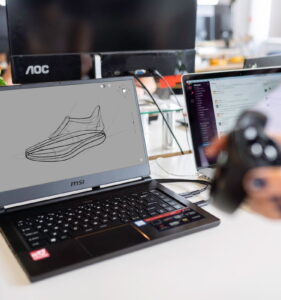Sports have always been about pushing boundaries, breaking records, and achieving the impossible. Over the years, athletes have relied on their physical abilities and mental strength to excel in their respective fields. However, with the advent of technology, the game has changed. From smart stadiums to data-driven training, technology is revolutionizing the world of sports. In this article, we explore 5 ways in which innovation is transforming the sports industry.
Smart Stadiums
Gone are the days when spectators had to rely on the scoreboard to keep track of the game. With the rise of smart stadiums, fans can now enjoy a fully immersive experience. These modern stadiums are equipped with high-tech features such as video walls, interactive screens, and augmented reality displays that provide real-time information and statistics about the game. Fans can also use their smartphones to access a range of features such as ordering food and beverages, checking live scores, and even accessing virtual reality experiences. These smart stadiums not only enhance the fan experience but also provide valuable data that can be used to improve player performance and game strategy.
Wearable Technology
Wearable technology is another game-changer in the sports industry. Athletes are now using devices such as smartwatches, heart rate monitors, and GPS trackers to monitor their performance and improve their training regimes. These devices can provide real-time data on heart rate, calorie burn, and distance covered, helping athletes to optimize their workouts and track their progress. Wearable technology is also being used to monitor the health and well-being of athletes, providing valuable insights into factors such as sleep quality, stress levels, and recovery time.
Virtual Reality
Virtual reality is transforming the way athletes train and prepare for competitions. By using VR technology, athletes can simulate real-world scenarios and practice their skills in a safe and controlled environment. For example, a basketball player can practice shooting from different angles and positions, or a snowboarder can practice their tricks without the risk of injury. Virtual reality is also being used to enhance the fan experience, providing immersive experiences such as 360-degree live streams of games and interactive VR experiences.
Data Analysis
Data analysis is becoming increasingly important in the world of sports. Teams are using data analytics tools to track player performance, identify areas for improvement, and develop game strategies. These tools can provide valuable insights into factors such as player fitness, performance under pressure, and success rates for specific plays. Data analysis is also being used to improve the fan experience, providing real-time statistics and insights into the game.
3D Printing
3D printing is another technology that is revolutionizing the sports industry. From custom-designed sports equipment to personalized orthotics, 3D printing is enabling athletes to access products that are tailored to their individual needs. For example, a runner can have a pair of shoes 3D printed that are designed to fit their unique foot shape and running style. 3D printing is also being used to create prototypes and test new designs for sports equipment, allowing manufacturers to bring new products to market faster and more efficiently.
AI and Machine Learning
Artificial intelligence (AI) and machine learning are also transforming the sports industry. These technologies are being used to analyze vast amounts of data and identify patterns and insights that would be impossible for humans to detect. For example, AI and machine learning algorithms can analyze video footage of games and practices to identify weaknesses in players’ technique and provide personalized feedback on how to improve. These technologies are also being used to predict outcomes and identify new strategies that can give teams a competitive advantage.
Social Media
Social media has become an integral part of the sports industry, providing fans with a way to connect with their favorite athletes and teams, and stay up-to-date with the latest news and events. Social media platforms such as Twitter, Facebook, and Instagram are being used by athletes and teams to build their brand and engage with fans, while also providing valuable insights into fan preferences and behavior. Social media is also being used to enhance the fan experience, with platforms such as Snapchat and TikTok providing innovative ways to share highlights and engage with fans during games.
Cloud Computing
Cloud computing is another technology that is transforming the sports industry. By using cloud-based platforms, teams can store and analyze vast amounts of data, collaborate on game strategies, and share information with coaches and players in real-time. Cloud computing is also being used to improve the fan experience, with platforms such as NFL Game Pass and NBA League Pass providing fans with access to live and on-demand games, highlights, and exclusive content.
eSports
eSports is a rapidly growing industry that combines technology and sports in a unique way. eSports refers to competitive video gaming, where players compete against each other in virtual environments. eSports events are often held in stadiums, with thousands of fans attending to watch the action unfold. eSports is not only a new form of entertainment but also a lucrative industry, with millions of dollars in prize money up for grabs.
Smart Coaching
Smart coaching is a new concept that combines technology with coaching to provide athletes with personalized feedback and advice. Smart coaching platforms use AI and machine learning algorithms to analyze data on an athlete’s performance and provide feedback on areas for improvement. This technology is being used to help athletes of all levels to improve their skills and achieve their goals, from amateur athletes to professional sports teams.
In conclusion, technology is transforming the sports industry in many exciting ways. From AI and machine learning to social media, cloud computing, eSports, and smart coaching, innovation is changing the game. These technologies not only enhance the fan experience but also provide athletes with valuable tools to improve their performance and achieve their goals. As technology continues to evolve, we can expect to see even more exciting developments in the world of sports, as innovation continues to revolutionize the game.


